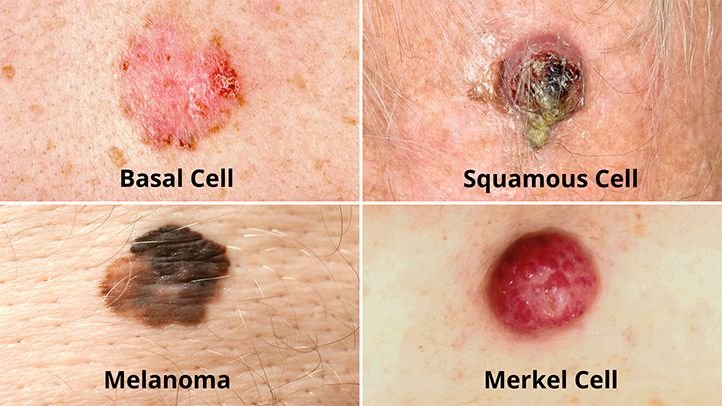Understanding Skin Cancer: Types, Risk Factors, and Treatment

Introduction:
Skin cancer is a prevalent and potentially life-threatening disease that occurs when abnormal cells in the skin grow uncontrollably. It primarily develops due to exposure to ultraviolet (UV) radiation from the sun or tanning beds. In this blog, we will explore the different types of skin cancer, the key risk factors associated with this condition, and the available treatment methods.
Types of Skin Cancer:
- Basal Cell Carcinoma (BCC):
- BCC is the most common type of skin cancer.
- Treatment includes surgical excision, cryotherapy (freezing), laser therapy, and topical medications like imiquimod.
- Squamous Cell Carcinoma (SCC):
- SCC is the second most common type.
- Treatment options include surgical removal, radiation therapy, topical chemotherapy, or Mohs surgery for complex cases.
- Melanoma:
- Melanoma is less common but the deadliest form of skin cancer.
- Treatment depends on the stage and may involve surgery, chemotherapy, radiation therapy, immunotherapy, or targeted therapy.
- Merkel Cell Carcinoma (MCC):
- MCC is a rare but aggressive skin cancer.
- Treatment includes surgery, radiation therapy, chemotherapy, or immunotherapy.
Risk Factors for Skin Cancer:
- UV Exposure: Prolonged exposure to UV radiation from the sun or tanning beds is the most significant risk factor. Protect your skin with sunscreen, clothing, and shade.
- Fair Skin: People with fair skin, light hair, and blue or green eyes are more susceptible to skin cancer because they have less melanin, which provides some protection against UV rays.
- Family History: If you have a family history of skin cancer, your risk may be higher due to genetic factors.
- Age: The risk of skin cancer increases with age, with most cases occurring in people over 50.
- Moles: Large numbers of moles or atypical moles (dysplastic nevi) can increase the risk of melanoma.
- Immunosuppression: A weakened immune system, whether due to medical conditions or medications, can increase the risk of skin cancer.
- Previous Skin Cancer: A history of skin cancer, even non-melanoma types, increases the risk of developing new skin cancers.
- Geographic Location: Living in areas with high sun exposure and low cloud cover increases the risk of skin cancer.
- Xeroderma Pigmentosum: A rare genetic disorder that impairs the body’s ability to repair DNA damage from UV radiation.
- Chemical Exposure: Occupational exposure to certain chemicals like arsenic or coal tar can increase the risk of skin cancer.
Treatment Methods: Treatment for skin cancer depends on the type, stage, and location of the cancer. Common treatment methods include:
- Surgery: Surgical removal is often the primary treatment. This can involve excision of the cancerous tissue and, in some cases, lymph node removal.
- Radiation Therapy: This uses high-energy rays to target and destroy cancer cells. It’s often used for SCC and MCC.
- Chemotherapy: Medications that kill cancer cells may be administered orally or intravenously for advanced cases.
- Immunotherapy: Boosts the body’s immune system to help it fight cancer cells. It’s particularly effective for some melanoma cases.
- Targeted Therapy: Uses drugs that target specific molecules involved in cancer growth, often used for advanced melanoma.
- Topical Medications: For certain early-stage skin cancers, topical creams or gels like imiquimod or fluorouracil may be applied.
- Mohs Surgery: A specialized procedure for removing complex or recurrent skin cancers layer by layer, ensuring minimal damage to healthy tissue.
In conclusion, skin cancer is a serious condition with several types, each requiring different treatment approaches. Early detection and prompt treatment are crucial for better outcomes. Protecting your skin from UV radiation remains the best prevention method, alongside regular self-examinations and professional check-ups. If you suspect skin cancer or notice any suspicious changes, consult a dermatologist for proper evaluation and treatment. Remember that advances in medical science offer hope for those diagnosed with this disease.

